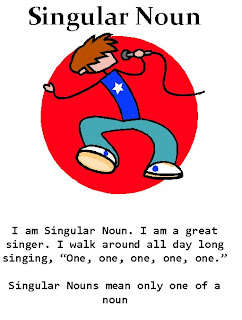In linguistics, grammatical number is a grammatical category of nouns, pronouns, and adjective and verb agreement that expresses count distinctions (such as "one", "two", or "three or more In many languages, including English, the number categories are อ่านเพิ่มเติม
วันอาทิตย์ที่ 30 กรกฎาคม พ.ศ. 2560
singular noun
In linguistics, grammatical number is a grammatical category of nouns, pronouns, and adjective and verb agreement that expresses count distinctions (such as "one", "two", or "three or more In many languages, including English, the number categories are อ่านเพิ่มเติม
adjective
In linguistics, an adjective (abbreviated adj) is a describing word, the main syntactic role of which is to qualify a noun or noun phrase, giving more information about the object signified อ่านเพิ่มเติม
noun
nouns are words that indicate a person, place, or thing.
In a sentence, nouns can function as the subject or the object of a verb. Nouns can also follow linking verbs to rename or re-identify อ่านเพิ่มเติม
if-clauses
Conditional sentences are sometimes confusing for learners of English as a second language.
structure of if-clauses has tree type
first= If+s+v1,s+will/shall+v1 อ่านเพิ่มเติม
structure of if-clauses has tree type
first= If+s+v1,s+will/shall+v1 อ่านเพิ่มเติม
active-passive voice
Present simple and continuous: The car is repaired. The car is being repaired.
Past simple and continuous: The car was repaired. The car was being repaired.
Present perfect: อ่านเพิ่มเติม
gerund
การใช้ gerund เป็นประธานของประโยคนี้ เราสามารถสร้างเองได้ โดยการนำคำกริยาที่ไม่ต้องมีกรรมมารองรับหรือที่ต้องมีกรรมมารองรับคำใดก็ได้มาทำเป็น gerund โดยการเติม –ing เข้าไปที่คำกริยาคำนั้น
อ่านเพิ่มเติม
infinitive without to
We use the infinitive without to after modal verbs can, could, may, might, will, shall, would, should, must: and if you see modal verb before space you should use infinitive without to
example you will stay with me. it's true
you will to stay with me. it's wrong อ่านเพิ่มเติม
สมัครสมาชิก:
ความคิดเห็น (Atom)





